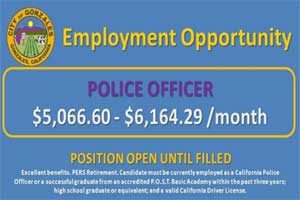How to Attract and Hire Great Candidates
In today’s tight job market prospective applicants have many choices. Just as applicants compete for select hiring slots, law enforcement agencies must compete for quality candidates. That competition isn’t just other agencies, but the many career options available to potential recruits. According to The Washington Post, police officer applications have plummeted at most police Departments.
For many prospective applicants, as much as they would like to pursue a career in law enforcement, dealing with a hiring process that isn’t “applicant friendly” often leads to pursuing other career paths. When law enforcement agencies become competitive, they can keep their standards high and attract great candidates.
A successful recruiting program is not necessarily dependent upon a large budget. In November of 2017, US Customs and Border Protection awarded a recruiting contract to a company for $297 million dollars. The end result was two accepted job offers. That translates to an acquisition cost per hire of $148.5 million dollars. Successful recruiting is more about making sure that you are doing the “right things” and avoiding “mistakes.”
1. Maintain a Job Interest List
In addition to making a big push when hiring, maintaining a list of people who have expressed an interest in working for your department is a great way to get ahead of the game. However, it is important to stay in touch with your list even if you are not currently hiring. Sending out regular emails about what is going on in your department, and providing tips about pursuing a career in law enforcement, will go a long way.
2. The Job Announcement
Many job announcements look more like a legal disclaimer than a posting for applicants. The more straight forward the posting, the better the results. Applicants want to know the minimum qualifications, the preferred qualifications, a short job description, how to apply, and information about the hiring process. It is best for everything to be contained in s single job posting. While linking to other helpful documents is fine, such as a list of disqualifiers, detailed information about the job and the main elements that an applicant needs to know should be contained in the job announcement itself.
– Closing Date
Provide enough time for an applicant to come across your listing and then subsequent time to apply. If an applicant checks for new openings every 2 weeks it is a good idea to assume that someone may see your posting after it has been open for a week. Therefore providing a minimum of a 3-week window for applying is a good start. Therefore, any job announcement should be open long enough for an applicant to find it and apply.
– Minimum Job Requirements
Many agencies have a 4-year degree as one of the minimum requirements. An applicant who may be graduating in the next few months may want to apply but cannot because they do not yet meet the minimum requirements. Some agencies will allow someone to apply a few months prior to graduation knowing that the hiring process will take longer than those few months the applicant has left before graduating. College graduates can be a great pool of applicants, and getting them into the hiring process as early as possible will increase your agencies chances of getting those applicants. Also, there are a variety of job titles such as “Entry Level Police Officer” and “Police Officer Recruit” as well as “Probationary Police Officer.” There is no standardization to what each of these titles mean so make certain to explain in detail what the minimum requirements are.
– Candidate Diversity
There are many candidates who may have planned for years that law enforcement was their career goal. They may have been involved with a law enforcement explorer program, they may have gone to college from criminal Justice, they may have done a law enforcement internship. However, there are many great applicants who fall outside of this. If your agency is seeking people with a variety of degrees, not just criminal justice, then say so in your job announcement or recruiting page. If you are seeking people who may have a wider range of life experiences, than say so. If you seek people who may be making a career change in their lives, then say so in your job announcement or recruiting page.
3. Outline Hiring Process
On your website have a section which explains your hiring process. Describe each stage of the process including what it entails, who moves on to the next step, and most importantly the time span between one stage and the next. It is also beneficial to provide links to more detailed resources that can provide a more thorough understanding about each stage.
– Written Exam
On your website provide as much information as possible about the written exam including any information that will help an applicant properly prepare for the exam.
- What subjects are contained in the written exam?
- How long is the exam?
- Do you provide any sample questions or do you recommend any study guides?
- Who will be allowed to take the written exam?
- Who advances from the written exam?
– Physical Agility Test
On your website list what is contained in your Physical Agility Test including if possible what is required to pass each event. Explain how applicants will be evaluated, is it pass fail, and link to resources that will help applicants prepare the test. Some agencies have put together short videos which explain their physical agility test and show the proper techniques for various elements of the test. Outline who moves on past the physical agility test.
– Oral Board Interview
Explain on your website about the Oral Board Interview including how many panelists there may be, how long the interview is, and the types of questions which may be asked. Also cover how applicants will find out the results of their interview. Link to any resources which may help an applicant prepare the interview.
– Psychological Assessment
If your agency has a psychological assessment, explain on your website what that assessment entails. Talk about why is it used, how long it lasts, and how applicants will find out if they passed.
– Polygraph
If your agency uses a polygraph for applicants, use your website as an opportunity to explain what that examination includes. Talk about why it is used, how long it lasts, and how applicants find out if they passed.
– Chief’s Interview
If your agency has a Chief’s Interview then take the opportunity to explain what that is. How long does it last. What types of questions are asked during the Chief’s Interview. Are there any suggestions regarding how to prepare for it.
– Background Investigation
Provide applicants with information concerning the background process including what the process entails, who will be interviewed, and how long the background process takes.
4. Application
Make certain that whatever documents are required to apply, are easily accessible from the job announcement. Some agencies “refer” to how an applicant can apply without actually providing a link to the specific application. Sometimes the applicant has to look through a list of applications to determine which is the correct one for the job they are applying for. Anything that is required to be filled out as part of the application process should be linked to in the job announcement and any documents required to be provided as part of the application should also be listed. Also listed should be if original/certified copies of documents are required, or if copies are satisfactory.
5. Keep Candidates Informed
Anyone who is applying for a position wants to be kept informed as to where they stand in the hiring process. This can vary from just being able to call the recruiter to find out their status, to having a self service system where applicants can track the status of their application.
6. Training/Practice Sessions
Offer clinics where you help applicants prepare for each stage of the selection process. These can range from a few hour sessions to all day events. For applicants who are willing to put in the time and effort to properly prepare, providing a forum for this will be beneficial and will also pay off in attracting applicants not familiar with the law enforcement hiring process.
– Clinics for Physical Agility
Some agencies run clinics to help applicants prepare for the physical agility test, giving applicants a clear understanding of what their test includes. Also, many applicants have questions as to what is considered “acceptable techniques” for various portions of the test.
– Written Exam Practice Sessions
Provide applicants with information about the make-up of the written exam. What does the written exam consist of such as multiple choice, writing samples, etc. How many questions are on the exam and how is it graded. Many agencies have found success with conducting written exam preparation sessions. This helps give applicants a sample of what is covered on the exam and also provides an opportunity for applicants to ask questions. Answers to basic information such as can you bring in scratch paper, how long is the exam, and are their breaks, will help put applicants at ease.
– Oral Board Practice Sessions
The oral board interview is a very new and unique experience for most applicants, with many not knowing what to expect. Agencies can arrange practice sessions where applicants can practice mock interviews to gain experience.
7. Accommodate Out of Town Applicants
Offering a condensed hiring process for out of town applicants is very beneficial. Often, the written, the physical agility, and the oral board interview can be offered during the course of one weekend, and only to those who do not live in the area.
8. Recruiter Availability
During the entire hiring process applicants often have questions. It is imperative for someone, usually a recruiter, to be available so that the applicant knows that whenever they have a question, a recruiter will follow-up with them in a reasonable time period. An applicant who has a question about the application may pass on applying if they are not able to get their question answered in a timely manner.
9. Open Houses and Webinars
Law Enforcement open houses provide a great way for potential applicants to learn about the agency, the hiring process, and to interact with officers from that agency. Webinars are a great way to reach applicants who are unable to attend an open house. It also provides a way for applicants to ask questions who do not feel comfortable asking questions in person. A webinar can be virtual version of an Open House. The webinar can be recorded and then made available on the agency website.
10. Consolidate the Hiring Process
The longer your hiring process takes, the more likely it is that you will lose good candidates to other agencies or other opportunities. Many candidates apply to multiple agencies. Therefore, they are more likely to accept a job offer that comes in sooner than pass over offers and wait for another one. If your agency has a long hiring process, you will be waiting while applicants on your list are being hired by other agencies.
Good candidates have options. Expecting a quality applicant to wait several months or even years to be hired is unreasonable. Law enforcement agencies have traditionally had a very long hiring process. However, in today’s tight job market, every agency needs to evaluate their hiring process. They should look at how long each stage actually takes, and how much time is actually required between stages. Removing any unnecessary delays will pay off for the hiring agency.
Attracting quality candidates can be as simple as: providing useful information about your agencies hiring process to prospective applicants, making resources available to assist applicants with each stage whether it is clinics, tutorials, or other resources, making certain that their questions will always be answered in a reasonable time frame, and keeping the duration of the selection process as short as possible.

 Joseph Libowsky,
Joseph Libowsky,








